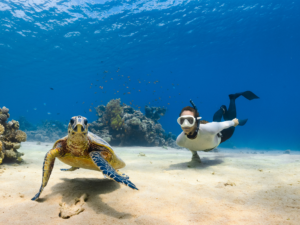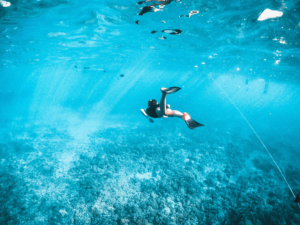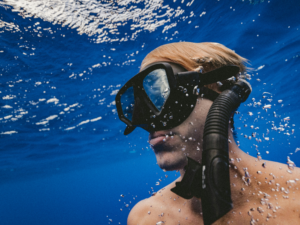Snorkeling Etiquette: Respect Marine Life
Snorkeling Etiquette: Respecting the Ocean and Wildlife
Snorkeling is a popular and exhilarating way to explore the underwater world. However, with great adventure comes great responsibility. Practicing proper snorkeling etiquette is essential to protect our oceans and the diverse wildlife that inhabits them. In this blog post, we will cover the key aspects of snorkeling etiquette that every snorkeler should keep in mind to ensure a safe, respectful, and enjoyable experience.
1. Stay on Designated Paths
One of the primary rules of snorkeling etiquette is to stay on designated paths or marked areas. Many popular snorkeling spots have specific routes to follow to minimize damage to fragile marine ecosystems. Coral reefs, for example, are incredibly sensitive to physical contact. By remaining on designated paths, you help preserve these vital habitats for future generations.
2. Do Not Touch Marine Life
While it may be tempting to reach out and touch the colorful fish or vibrant corals, touching marine life can be harmful. Many creatures have delicate bodies and structures that can be damaged by human contact. Additionally, some species may even pose a danger to snorkelers. Practicing good snorkeling etiquette means observing marine life from a safe distance, allowing them to thrive in their natural habitat without interference.
3. Avoid Standing on Coral
When snorkeling, it’s essential to maintain buoyancy and avoid standing on coral reefs. Coral is a living organism, and physical contact can cause irreversible damage. Even the most well-intentioned snorkeler can inadvertently crush fragile corals by standing or resting on them. Instead, float or swim above the reef and take in the beauty from a distance. This practice is fundamental to snorkeling etiquette and crucial for marine conservation.
4. Use Reef-Safe Sunscreen
The sunscreen you apply before heading into the water can have significant impacts on the environment. Many commercial sunscreens contain harmful chemicals that can damage coral reefs and marine life. Opt for reef-safe sunscreens that are free of oxybenzone and octinoxate, which are known to contribute to coral bleaching. By using environmentally-friendly products, you practice responsible snorkeling etiquette and contribute to the health of the oceans.

5. Respect Wildlife
When snorkeling, it’s important to remember that you are a guest in the ocean, and all marine creatures should be treated with respect. Keep your distance from wildlife and avoid chasing or cornering them. Snorkeling etiquette involves observing creatures in their natural behavior without disturbing them. If you encounter larger animals, such as sea turtles or dolphins, observe them from a distance and avoid making loud noises or sudden movements.
6. Be Mindful of Your Equipment
Your snorkeling gear should not only be safe for you but also for the environment. Make sure your fins are not too large, as this can lead to accidental damage to delicate habitats. Additionally, always check your equipment before heading into the water to ensure there are no leaks or defects that could create hazards for marine life. Being responsible with your snorkeling gear is an essential aspect of snorkeling etiquette.
7. Educate Yourself About Local Guidelines
Every snorkeling location has its own set of rules and guidelines designed to protect both snorkelers and marine life. Before you visit a new site, take the time to educate yourself about the local regulations and the specific marine ecosystems you’ll be interacting with. Knowledge is power, and understanding the importance of these guidelines is a crucial part of snorkeling etiquette.
8. Leave No Trace
As an eco-conscious snorkeler, it’s vital to practice the “leave no trace” principle. This means taking all your trash with you when you leave the beach or snorkeling site. Even biodegradable materials can harm marine life, so be diligent about keeping our oceans clean. Good snorkeling etiquette includes respecting the environment by leaving it as you found it.
Conclusion
In conclusion, practicing snorkeling etiquette is essential for preserving the beauty of our oceans and the wildlife that inhabits them. By following these guidelines—staying on designated paths, not touching marine life, avoiding standing on coral, using reef-safe sunscreen, respecting wildlife, being mindful of your equipment, educating yourself about local guidelines, and leaving no trace—you can enjoy your snorkeling adventures while protecting the delicate ecosystems beneath the waves. Remember, every snorkeler plays a part in ensuring that our oceans remain vibrant and healthy for generations to come.

The Snorkel Seeker team is composed of passionate snorkelers, marine enthusiasts, and outdoor adventurers committed to delivering the most reliable and captivating content for all your snorkeling needs.






